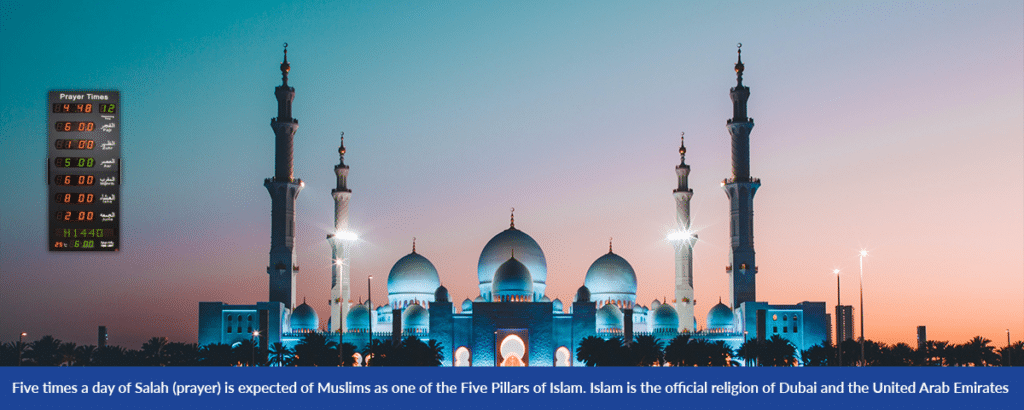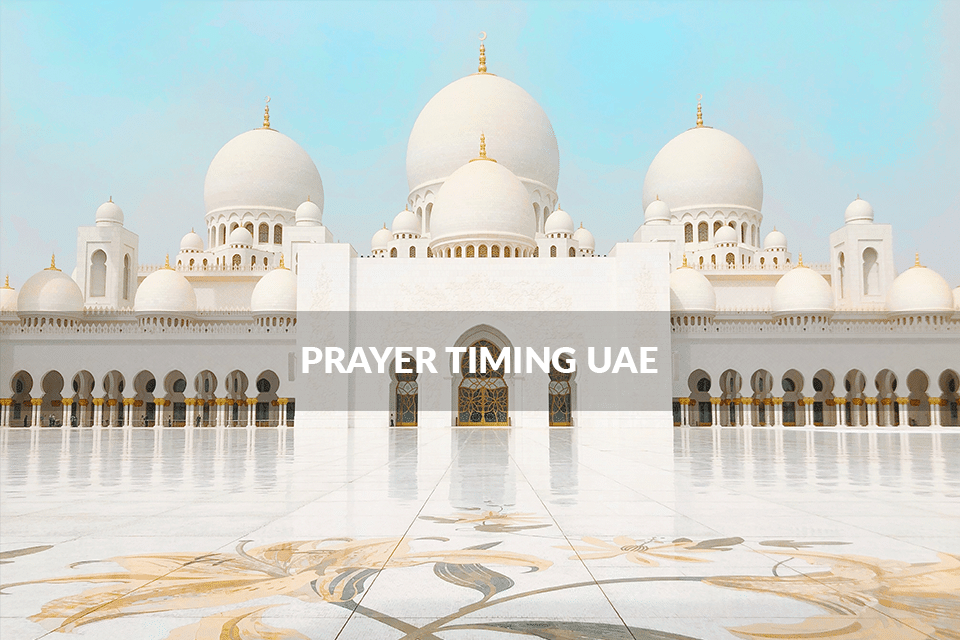Five times a day of Salah (prayer) is, expected of Muslims as one of the Five Pillars of Islam. Islam is the official religion of Dubai and the United Arab Emirates. In This Article you need to know Dubai Prayer Timing.
The times of prayer vary throughout the year in Dubai and across the world depending on the position of the sun and the hours of dawn and sunset.
Muslims are not required to pray at mosques they can do it wherever that is clean. In Dubai, the majority of places have designated prayer areas.
Although it is possible to pray alone, its endorsed that one does it with other Muslims.
Muslims are, required to wash (wudu) before prayer.
Muslims must face the Kaaba, a cube-shaped structure in the middle of the
Masjid al-Haram (Sacred Mosque) in Mecca, Saudi Arabia when they are praying.
The direction facing the Kaaba from any location on Earth is, referred to as the Qibla.
Five pillars of Islam:
- Dubai and the United Arab Emirates (UAE) both recognize Islam as their official religion. The five Islamic pillars should be, followed by all Muslims and followers of Islam:
- Declaring that there is no deity but Allah and that Muhammad is his prophet (Shahadah)
- Offering five daily prayers, or Salah.
- Giving to the needy and the underprivileged is, known as zakat.
- Ramadan, the ninth month of the Islamic calendar, is a sacred month, and fasting is, known as sawm.
- All Muslims should at least once in their lives do the Hajj,
or pilgrimage, to the holy city of Mecca.
The second most significant Islamic tenet is prayer. Do you call Dubai home? Knowing when to pray in Dubai is crucial.
You may employ this to organize your day and substantiate you don’t forget about any of your religious commitments.
Salah:
Salah, which translates to “prayer” or “supplication,” is also known as “Namaz” by Muslims who are not Arab. One of Islam’s five pillars, which include the religion’s fundamental principles and rituals, is Salah.
Muslims hold five daily prayers, beginning with:
Fajr :
The first prayer of the day, offered at the hour just before dawn.
Dhuhr:
Which occurs shortly after midday following the Sun’s ascent to the zenith.
Asr or Asar:
Which occurs in the late afternoon;
Maghrib:
Just after dusk and;
Isha:
Nighttime prayer from dusk to one in the morning.
Other prayers include:
Along with the five required prayers, there are other prayers:
- Jumu’ah prayer: which is, offered at noon on Fridays.
- Early in the morning, the Tahjjud prayer is, offered. Nevertheless, it is not required.
- Only performed during the holy month of Ramadan, the Tarawih prayer is, offered together with the Isha prayer.
- (Offered on Eid Al Fitr and Eid Al Adha) – Eid prayers.
5 Times Prayer.
- Fajr: This is the pre-dawn prayer. The timing for Fajr begins with the first light of dawn and ends just before sunrise.
- Dhuhr: This is the midday prayer. It starts when the sun passes its zenith and begins to decline.
- Asr: This is the afternoon prayer. It begins when the shadow of an
object is equal to its length, plus the length of the object’s shadow at noon. - Maghrib: This is the evening prayer. It starts immediately after sunset.
- Isha: This is the night prayer. It begins when the red twilight disappears from the sky and lasts until midnight.

AZAN:
The azan (or adhan), the call to prayer, is recited by the muezzin, a designated crier. The call to prayer is to be, performed by the crier from the mosque’s tower.
Nowadays, the minarets of many mosques are equipped with loudspeakers. The muezzin will either play a recording or utilize a microphone.
POSITION OF SALAH:
Salah is performed in an array of postures, including Qiyam, Ruku, Sajdah, and Tashshhud. These activities have a variety of advantages, such as:
QIYAM (SEATED):
It guarantees normal blood flow to the lower body, strengthening the muscles in the legs.
RUKU:
This position is beneficial to the lower spinal column. Back pain is reduced and prevented by it. It entails extending the elbows, wrists, knees, and ankles, which results in increased flexibility throughout the body.
Prostration or low bowing before God in the direction of the qiblah is known as sajdah. Sajdah maintains blood flow to the brain and stimulates the pituitary and pineal glands.
TASHAHHUD (SITTING STANCE):
This posture is related to Vajrasana, an important Yoga pose. The position is supposed to enhance digestion, maintain the spine straight and erect, and strengthen the thigh and calf muscles.
UAE MOSQUES:
Mosques (masjids) are a frequent sight throughout the United Arab Emirates. There are over a thousand mosques in cities, and they may be, found in practically every neighborhood. With the help of our Prayer Timing location tool, you may locate the closest mosque.
Mosques are essential in the Muslim community because they provide a place of prayer.
Mosques act as a social hub for Muslims in Dubai in addition to being religious centers.
They give individuals a space to congregate and talk about significant problems and give Muslims a feeling of community.
Among the mosques in Dubai are:
- Jumeirah Mosque.
- Al Farooq Omar Bin Al Khattab Mosque: The Sultan Ahmed Mosque (Blue Mosque) in Istanbul is a building with 21 domes, and this mosque is remarkable for having them. Al Safa is where it is visited by non-Muslims.
- Near the Mall of the Emirates in Al Barsha is the Al Salam Mosque.
- On the Palm Jumeirah, adjacent to The Pointe, is the Abdul Rahman Siddique Mosque.
- Al Rahim Mosque is, situated near Dubai Marina’s southernmost point.
- The City Walk Mosque is, situated at City Walk.
- At the Dubai International Financial Center (DIFC), there is a grand mosque.
- Ali Ibn Abi Talib Mosque is another name for the Iranian mosque. Bur Dubai is the location.
- Grand Mosque in Bur Dubai.

Prayer Timing:
| July | Day | Hijri | Month | Fajr | Sunrise | Dhuhr | Asr | Maghrib | Isha |
| 1 | Saturday | 13 | Thul-Hijjah | 4:02 AM | 5:29 AM | 12:26 PM | 3:46 PM | 7:16 PM | 8:43 PM |
| 2 | Sunday | 14 | Thul-Hijjah | 4:03 AM | 5:29 AM | 12:26 PM | 3:47 PM | 7:16 PM | 8:43 PM |
| 3 | Monday | 15 | Thul-Hijjah | 4:03 AM | 5:30 AM | 12:26 PM | 3:47 PM | 7:16 PM | 8:43 PM |
| 4 | Tuesday | 16 | Thul-Hijjah | 4:04 AM | 5:30 AM | 12:26 PM | 3:47 PM | 7:16 PM | 8:42 PM |
| 5 | Wednesday | 17 | Thul-Hijjah | 4:04 AM | 5:30 AM | 12:26 PM | 3:47 PM | 7:16 PM | 8:42 PM |
| 6 | Thursday | 18 | Thul-Hijjah | 4:05 AM | 5:31 AM | 12:26 PM | 3:48 PM | 7:16 PM | 8:42 PM |
| 7 | Friday | 19 | Thul-Hijjah | 4:05 AM | 5:31 AM | 12:27 PM | 3:48 PM | 7:16 PM | 8:42 PM |
| 8 | Saturday | 20 | Thul-Hijjah | 4:06 AM | 5:31 AM | 12:27 PM | 3:48 PM | 7:16 PM | 8:42 PM |
| 9 | Sunday | 21 | Thul-Hijjah | 4:06 AM | 5:32 AM | 12:27 PM | 3:48 PM | 7:16 PM | 8:41 PM |
| 10 | Monday | 22 | Thul-Hijjah | 4:07 AM | 5:32 AM | 12:27 PM | 3:49 PM | 7:16 PM | 8:41 PM |
| 11 | Tuesday | 23 | Thul-Hijjah | 4:07 AM | 5:33 AM | 12:27 PM | 3:49 PM | 7:16 PM | 8:41 PM |
| 12 | Wednesday | 24 | Thul-Hijjah | 4:08 AM | 5:33 AM | 12:27 PM | 3:49 PM | 7:15 PM | 8:41 PM |
| 13 | Thursday | 25 | Thul-Hijjah | 4:09 AM | 5:34 AM | 12:27 PM | 3:49 PM | 7:15 PM | 8:40 PM |
| 14 | Friday | 26 | Thul-Hijjah | 4:09 AM | 5:34 AM | 12:27 PM | 3:50 PM | 7:15 PM | 8:40 PM |
| 15 | Saturday | 27 | Thul-Hijjah | 4:10 AM | 5:35 AM | 12:28 PM | 3:50 PM | 7:15 PM | 8:39 PM |
| 16 | Sunday | 28 | Thul-Hijjah | 4:10 AM | 5:35 AM | 12:28 PM | 3:50 PM | 7:14 PM | 8:39 PM |
| 17 | Monday | 29 | Thul-Hijjah | 4:11 AM | 5:35 AM | 12:28 PM | 3:50 PM | 7:14 PM | 8:38 PM |
| 18 | Tuesday | 30 | Thul-Hijjah | 4:12 AM | 5:36 AM | 12:28 PM | 3:51 PM | 7:14 PM | 8:38 PM |
| 19 | Wednesday | 1 | Muharram | 4:12 AM | 5:36 AM | 12:28 PM | 3:51 PM | 7:14 PM | 8:37 PM |
| 20 | Thursday | 2 | Muharram | 4:13 AM | 5:37 AM | 12:28 PM | 3:51 PM | 7:13 PM | 8:37 PM |
| 21 | Friday | 3 | Muharram | 4:14 AM | 5:37 AM | 12:28 PM | 3:51 PM | 7:13 PM | 8:36 PM |
| 22 | Saturday | 4 | Muharram | 4:14 AM | 5:38 AM | 12:28 PM | 3:52 PM | 7:12 PM | 8:36 PM |
| 23 | Sunday | 5 | Muharram | 4:15 AM | 5:38 AM | 12:28 PM | 3:52 PM | 7:12 PM | 8:35 PM |
| 24 | Monday | 6 | Muharram | 4:16 AM | 5:39 AM | 12:28 PM | 3:52 PM | 7:12 PM | 8:35 PM |
| 25 | Tuesday | 7 | Muharram | 4:16 AM | 5:39 AM | 12:28 PM | 3:52 PM | 7:11 PM | 8:34 PM |
| 26 | Wednesday | 8 | Muharram | 4:17 AM | 5:40 AM | 12:28 PM | 3:52 PM | 7:11 PM | 8:33 PM |
| 27 | Thursday | 9 | Muharram | 4:18 AM | 5:40 AM | 12:28 PM | 3:52 PM | 7:10 PM | 8:33 PM |
| 28 | Friday | 10 | Muharram | 4:18 AM | 5:41 AM | 12:28 PM | 3:53 PM | 7:10 PM | 8:32 PM |
| 29 | Saturday | 11 | Muharram | 4:19 AM | 5:41 AM | 12:28 PM | 3:53 PM | 7:09 PM | 8:31 PM |
| 30 | Sunday | 12 | Muharram | 4:20 AM | 5:42 AM | 12:28 PM | 3:53 PM | 7:09 PM | 8:30 PM |
| 31 | Monday | 13 | Muharram | 4:20 AM | 5:42 AM | 12:28 PM | 3:53 PM | 7:08 PM | 8:30 PM |
FAQ’S
Yes, the Muslim call to prayer is, extensively utilized in areas such as Muscat and Dubai. Some well-known mosques in Muscat are the Bahwan Mosque and Al Wadi al Kabir.
Qibal route from Dubai to the holy city of Mecca The Qibla from Dubai, United Arab Emirates, points directly toward Mecca in the direction of 254° WSW 1633.0882 kilometers separate the two locations.
You may install legit apps for qibla finder or consult with Muslim brothers and sisters for directions.
Fajr: Two rakats of prayer offered before dawn (sunrise)
Dhuhr: A four-Rakat prayer offered at midday (when the sun has risen to its highest point)
Asr: A four-Rakat prayer in the late afternoon.
Maghrib: three rakats of prayer immediately before dusk.
Isha: A four-Rakat prayer said between dusk and dawn.
CONCLUSION
The schedule of prayers in the United Arab Emirates (UAE) is in accordance with Islamic tradition and is a significant part of Muslims’ everyday lives there. Islam is the country’s official religion, and the UAE is an Islamic state.
As’a result, institutions, organizations, and public spaces all throughout the UAE rigidly observe and accommodate Prayer Timing.
The public is, given important information about Prayer Timing by the UAE government and religious bodies. The daily prayer hours are often announced by mosques, Islamic centers, and regional media, ensuring that Muslims are informed of the precise times for each prayer.
In the end, UAE adheres to Islamic tradition when it comes to Prayer Timing,
and Muslims there observe them as a regular part of their everyday lives.
A person can complete their religious commitments and keep their spiritual connection by receiving reliable information about prayer hours from the UAE government, religious institutions, and numerous platforms.







